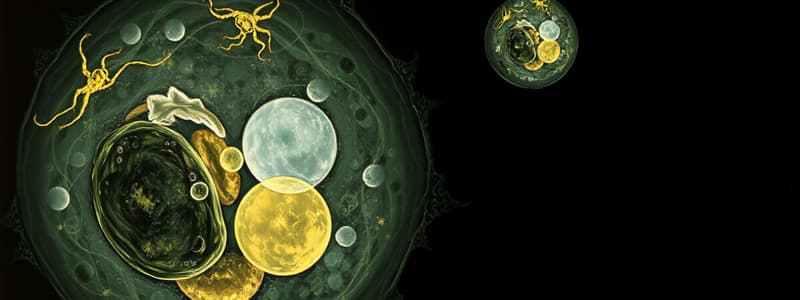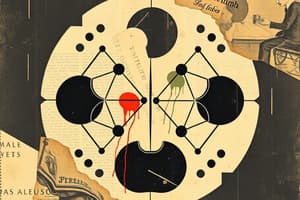Podcast
Questions and Answers
What occurs during metaphase of mitosis?
What occurs during metaphase of mitosis?
- Centrioles migrate to the poles
- Chromosomes uncoil and form chromatin
- Chromosomes line up on the equator of the cell (correct)
- Sister chromatids separate and move to opposite poles
Which event happens at the end of mitosis?
Which event happens at the end of mitosis?
- Cytokinesis occurs, forming two new daughter cells (correct)
- Daughter cells become genetically diverse
- Sister chromatids are still attached
- Nuclear membrane disappears
What is the role of cyclins in the cell cycle?
What is the role of cyclins in the cell cycle?
- They control cell cycle checkpoints (correct)
- They repair damaged DNA
- They synthesize new organelles
- They divide the cytoplasm
During which phase of the cell cycle does DNA replication occur?
During which phase of the cell cycle does DNA replication occur?
What defines a diploid cell?
What defines a diploid cell?
What occurs at the G1 checkpoint of the cell cycle?
What occurs at the G1 checkpoint of the cell cycle?
How do cancer cells differ from normal cells?
How do cancer cells differ from normal cells?
Which phase of meiosis is similar to metaphase in mitosis?
Which phase of meiosis is similar to metaphase in mitosis?
What is the main reason cells divide?
What is the main reason cells divide?
During which phase of the cell cycle does DNA replication occur?
During which phase of the cell cycle does DNA replication occur?
What is the final step in prokaryotic cell division through binary fission?
What is the final step in prokaryotic cell division through binary fission?
Which phase of mitosis involves the separation of sister chromatids?
Which phase of mitosis involves the separation of sister chromatids?
What does the term 'homologous pair' refer to in genetics?
What does the term 'homologous pair' refer to in genetics?
What key occurrence takes place during the G2 phase of the cell cycle?
What key occurrence takes place during the G2 phase of the cell cycle?
Which of the following is NOT a phase of mitosis?
Which of the following is NOT a phase of mitosis?
What must occur before a cell can enter mitosis?
What must occur before a cell can enter mitosis?
Which statement accurately describes meiosis?
Which statement accurately describes meiosis?
Which of the following describes cytokinesis?
Which of the following describes cytokinesis?
Flashcards are hidden until you start studying
Study Notes
Cell Reproduction
- Cell division produces two new daughter cells from a single parent cell, essential for growth, repair, and reproduction.
Types of Cell Division
- Prokaryotic Cells: Use binary fission, resulting in two identical daughter cells.
- Eukaryotic Cells: Undergo both mitosis (for growth and repair) and meiosis (for gamete formation), each serving distinct functions.
Reasons for Cell Division
- DNA Overload: As cells grow, a limit is reached where DNA can't meet cellular needs, leading to an information crisis.
- Exchange of Materials: Larger cells have inefficient exchange rates for nutrients and waste, risking cell survival.
Prokaryotic Cell Division: Binary Fission
- Steps of Binary Fission:
- DNA Replication: DNA is duplicated, creating two identical chromosomes.
- Chromosome Segregation: Chromosomes separate and move to opposite ends of the cell.
- Cytokinesis: Cytoplasm divides, yielding two genetically identical cells.
The Cell Cycle
- Interphase: The growth and DNA replication phase, consisting of G1, S, and G2 phases.
- G1 Phase: Cell grows in size.
- S Phase: DNA replication occurs, resulting in sister chromatids.
- G2 Phase: Organelles and cytoplasm are doubled in preparation for mitosis.
Eukaryotic Cell Division
- DNA resides within chromosomes located in the nucleus.
- Mitosis includes four phases—Prophase, Metaphase, Anaphase, and Telophase.
Mitosis Phases (PMAT)
- Prophase: Chromosomes condense and become visible; centrioles migrate to poles; nuclear membrane disintegrates; spindle apparatus forms.
- Metaphase: Chromosomes align at the cell's equatorial plane, and spindles attach to centromeres.
- Anaphase: Sister chromatids separate and are pulled toward opposite poles of the cell.
- Telophase: Chromosomes uncoil back to chromatin; nuclear membranes reform; spindle apparatus disappears.
Cytokinesis
- Occurs following mitosis, dividing the cytoplasm to form two new genetically identical daughter cells, with organelles distributed between them.
Meiosis
- Similar process to mitosis but aimed at producing gametes, resulting in cells with half the chromosome number.
Control of the Cell Cycle
- Cyclins: Regulatory proteins that oversee the cell cycle at checkpoints:
- G1 Checkpoint: Determines if a cell will divide.
- S Checkpoint: Assesses accuracy of DNA replication.
- Mitotic Spindle Checkpoint: Ensures correct alignment of chromosomes during mitosis.
Cancer Cells
- Develop from uncontrolled cell division, leading to tumors due to the loss of regulatory mechanisms within the cell cycle.
Summary of the Cell Cycle
- The eukaryotic cell cycle consists of G1, S, G2, mitosis, and cytokinesis.
- Binary fission in prokaryotes creates identical offspring.
- Chromosomes formed during interphase consist of two sister chromatids connected by a centromere.
- Diploid cells contain two sets of chromosomes, while haploid gametes form a zygote upon fusion.
Studying That Suits You
Use AI to generate personalized quizzes and flashcards to suit your learning preferences.




